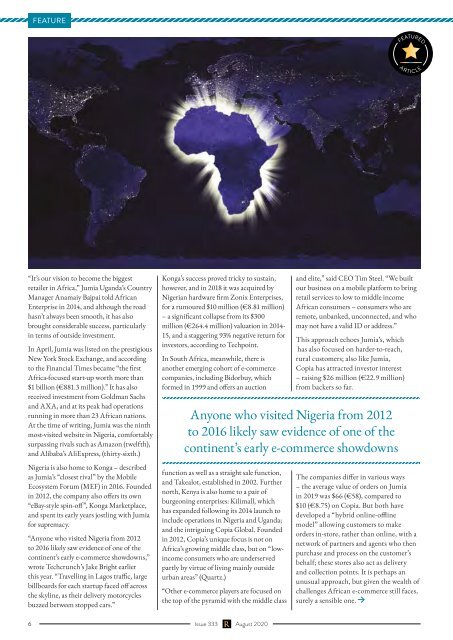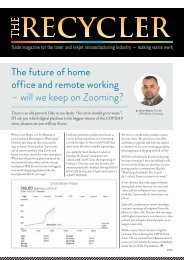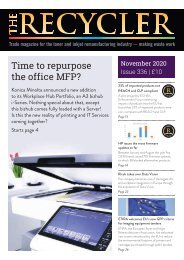The Recycler Issue 333
Create successful ePaper yourself
Turn your PDF publications into a flip-book with our unique Google optimized e-Paper software.
FEATURE<br />
FEATURED<br />
A R TIC L E<br />
“It’s our vision to become the biggest<br />
retailer in Africa,” Jumia Uganda’s Country<br />
Manager Anamaiy Bajpai told African<br />
Enterprise in 2014, and although the road<br />
hasn’t always been smooth, it has also<br />
brought considerable success, particularly<br />
in terms of outside investment.<br />
In April, Jumia was listed on the prestigious<br />
New York Stock Exchange, and according<br />
to the Financial Times became “the first<br />
Africa-focused start-up worth more than<br />
$1 billion (€881.3 million).” It has also<br />
received investment from Goldman Sachs<br />
and AXA, and at its peak had operations<br />
running in more than 23 African nations.<br />
At the time of writing, Jumia was the ninth<br />
most-visited website in Nigeria, comfortably<br />
surpassing rivals such as Amazon (twelfth),<br />
and Alibaba’s AliExpress, (thirty-sixth.)<br />
Nigeria is also home to Konga – described<br />
as Jumia’s “closest rival” by the Mobile<br />
Ecosystem Forum (MEF) in 2016. Founded<br />
in 2012, the company also offers its own<br />
“eBay-style spin-off”, Konga Marketplace,<br />
and spent its early years jostling with Jumia<br />
for supremacy.<br />
“Anyone who visited Nigeria from 2012<br />
to 2016 likely saw evidence of one of the<br />
continent’s early e-commerce showdowns,”<br />
wrote Techcrunch’s Jake Bright earlier<br />
this year. “Travelling in Lagos traffic, large<br />
billboards for each startup faced off across<br />
the skyline, as their delivery motorcycles<br />
buzzed between stopped cars.”<br />
Konga’s success proved tricky to sustain,<br />
however, and in 2018 it was acquired by<br />
Nigerian hardware firm Zonix Enterprises,<br />
for a rumoured $10 million (€8.81 million)<br />
– a significant collapse from its $300<br />
million (€264.4 million) valuation in 2014-<br />
15, and a staggering 93% negative return for<br />
investors, according to Techpoint.<br />
In South Africa, meanwhile, there is<br />
another emerging cohort of e-commerce<br />
companies, including Bidorbuy, which<br />
formed in 1999 and offers an auction<br />
function as well as a straight sale function,<br />
and Takealot, established in 2002. Further<br />
north, Kenya is also home to a pair of<br />
burgeoning enterprises: Kilimall, which<br />
has expanded following its 2014 launch to<br />
include operations in Nigeria and Uganda;<br />
and the intriguing Copia Global. Founded<br />
in 2012, Copia’s unique focus is not on<br />
Africa’s growing middle class, but on “lowincome<br />
consumers who are underserved<br />
partly by virtue of living mainly outside<br />
urban areas” (Quartz.)<br />
“Other e-commerce players are focused on<br />
the top of the pyramid with the middle class<br />
and elite,” said CEO Tim Steel. “We built<br />
our business on a mobile platform to bring<br />
retail services to low to middle income<br />
African consumers – consumers who are<br />
remote, unbanked, unconnected, and who<br />
may not have a valid ID or address.”<br />
This approach echoes Jumia’s, which<br />
has also focused on harder-to-reach,<br />
rural customers; also like Jumia,<br />
Copia has attracted investor interest<br />
– raising $26 million (€22.9 million)<br />
from backers so far.<br />
Anyone who visited Nigeria from 2012<br />
to 2016 likely saw evidence of one of the<br />
continent’s early e-commerce showdowns<br />
<strong>The</strong> companies differ in various ways<br />
– the average value of orders on Jumia<br />
in 2019 was $66 (€58), compared to<br />
$10 (€8.75) on Copia. But both have<br />
developed a “hybrid online-offline<br />
model” allowing customers to make<br />
orders in-store, rather than online, with a<br />
network of partners and agents who then<br />
purchase and process on the customer’s<br />
behalf; these stores also act as delivery<br />
and collection points. It is perhaps an<br />
unusual approach, but given the wealth of<br />
challenges African e-commerce still faces,<br />
surely a sensible one.<br />
6 <strong>Issue</strong> <strong>333</strong> August 2020
















